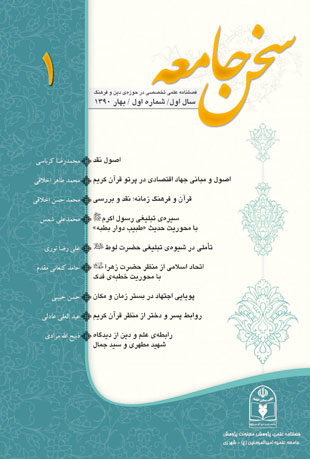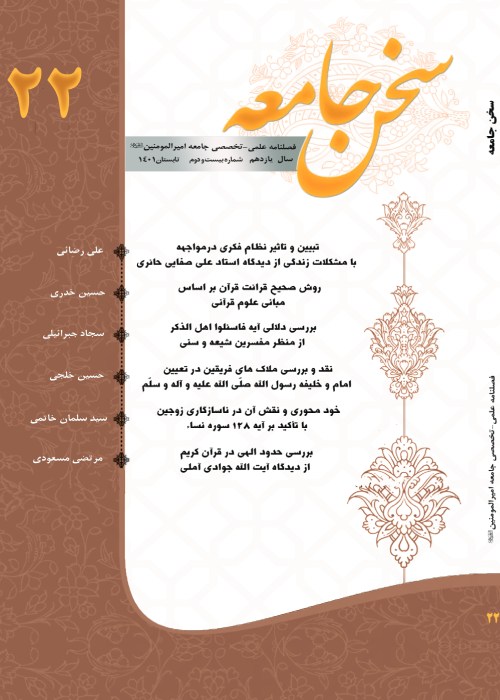فهرست مطالب

فصلنامه سخن جامعه
پیاپی 1 (بهار 1390)
- 172 صفحه، بهای روی جلد: 25,000ريال
- تاریخ انتشار: 1390/08/10
- تعداد عناوین: 10
-
صفحه 7
-
صفحه 9
-
صفحه 57
-
صفحه 77
-
صفحه 101
-
صفحه 115
-
صفحه 127
-
Page 9The present article while describing the concept of criticism and its status in the Islamic culture is go-ing to analyze and offer the readers the most impor-tant principles and foundations prevailing on criti-cism in the light of the holy Quran and Islamic tradi-tions. Therefore, the principles such as advice, wish-ing good for everyone, impartiality and avoidance of every kind of prejudice, possessing professionalism, reliance on logical demonstrations and … are intro-duced as the most important dominant primary laws of criticism.The fair and principled criticism is a warranty for the development of society. To take immorality and destruction instead of criticism would harm seriously this item. The only solution for this challenge accord-ing to the writer's view is to have a free and fair criti-cism and application of the above-mentioned princi-ples.
-
Page 25The economic struggle like every other human activity is based on series of foundations and princi-ples that without taking them into account clarifica-tion of their aspects is not accessible. Thus, the writer of the article tries to offer briefly some of the most important principles and foundations of economic struggle with the contribution of the Holy Quran's teachings and avail the profound and precise under-standing of the economic struggle for the distin-guished readers.In this article the foundations and infrastructure of the economic struggle has been scrutinized from two anthropological and cosmological perspectives. Based on this theory the substantial difference of the Islamic economic system is demonstrated with the rest of the economic schools thought. Moreover, the basic principles of economic struggle such as justice, economic independence, making use of the entire ex-istent capacities and avoidance of hoarding and tak-ing the capitals out of the production circle are also rotating around the very basis.
-
Page 57Every text including written scripture, image, statue, picture, film and … are someway expressive of situations, conditions, customs and traditions, beliefs and generally the prevailing discourses of the era of its formation. The Holy Quran being the book of human guidance is also enjoying the same character. With a brief look at the verses of the Holy Quran it can easily be deduced that what characters did an Arab of "ignorance age" have? Or what religions have been dominant and overriding in the Arabian Penin-sula. Keeping this point in mind some of the orien-talists and consequently some Muslim free-thinkers are of the idea that the Holy Quran has been em-phatically affected by the very dominant rites, cus-toms, the ignorant Arab traditions and those of the prevailing beliefs and attitudes of Arabian Peninsula. The most important reason of this faction is the verses of the holy Quran which connote the usage of the holy Quran and every divine text from the na-tion's language. The present writing is to analyze critically these approaches and those notions identical to them.
-
Page 77The writer of the article is has dealt with the preaching method of the Holy Prophet Muhammad (PBUHA& his households) on the basis of the tradi-tion (the doctor moving around his patients). The wisdom, good advice and the best argument are thought to be his means of preaching. He is of the idea that paying no attention to his procedure of preaching is one of the most serious harms and chal-lenges of the religious preachers in the contemporary period.
-
Page 87Preaching is one of the most important duties of a clergy that should always pay heed to and must never and in any circumstance avoid undertaking his missionary duty. But unfortunately in our present-day it is being witnessed that some clergies and religious students bringing many trivial pretenses shun from such decisive responsibility and do not undertake such duties. Thus I found it a personal duty of my own to have a brief look at the preaching life of Haz-rat Lot (a.s) and compare his prevailing atmosphere with what is going on in today's life of ours. So to duplicate his method of preaching and to invalidate the excuses of those who due to some social status and physical and … conditions do not shoulder such duties and exonerate themselves from every kind of blames including his own conscience's voice.
-
Page 101In the present-day situation the question of unity in the world of Islam has been altered to one of the most interested issues. Thus the writer tires to come up with this important topic based on Hazrat Zahra's speeches; for she has never left any stone unturned protecting the unity and solidarity of the Islamic community and even she sacrificed herself for the very sake. The writer in the very research firstly de-fines the concept of Islamic unity and clarifies what he means of this term. Then he has scrutinized the significance and necessity of the unity. In the conclu-sion part he while resorting to Hazrat Fatimah's Fadak sermon, introduces the holy Quran, the prophet of Islam and the infallible figures (peace be upon them all) as three bases and axis of creation and protection unity.
-
Page 115One of the reasons the glorious religion of Islam has lasted and was the seal of the prophethood is the struggle (Ijtihad) and deduction and in other word learning religion. The religious authority (Mujtahid) taking the principles of deduction into account and referring the changing offshoots to stable principles respond positively to the needs of his era and offer the due solutions for the Islamic community. None-theless, the general guidelines of Islamic rulings are stable, unchanging and limited but every epoch has its own particular requirements that cannot be met with-out struggle (Ijtihad). Thus, the article has also come up with the role of time and space in struggle and the way these two elements affected the Ijtihad.
-
Page 127The present paper has dealt with the issue of the relations of girl and boy being as one of the social challenges of modern era. Firstly, the standpoints along with their reasons would be cited and then will be critically reviewed. Afterward, the very issue is pro-pounded from the Holy Quran's perspective. In this case the relations of Hazrat Musa (a.s) and the daughters of Hazrat Shoiab are touched as a relation pattern for the faithful teenagers. Moreover, the key to success of Joseph against Zulaikha is also deemed to be stemmed from his deep faith and genuine be-liefs.Finally, some of the dangerous social and individ-ual consequences of insane relations between girl and boy would be pointed out as following: academic fail-ure, acceleration of sexual excitements, inexpedient marriage contracts, weakening the base of family life, spreading out vice and prostitution, wastage of the active and thriving strengths of society's teenagers.
-
Page 149Religion and science have been the two sources of acquiring cognition and knowledge for the human being throughout the history. The relation of these two key and worthy sources has been varied in various periods. Sometimes an agreeing relation and some-times a contradictory and conflicting relation gov-erned over these items. Sayyed Jamal and Professor Mutahhari while criticizing the western thought's foundations have chosen the cooperating and harmo-nious relation and have counted the factors of distor-tion of religious texts, priest's autocracy, and inaccu-rate visualization of Allah and Aristotle's science as motives of conflict and contradiction.\


